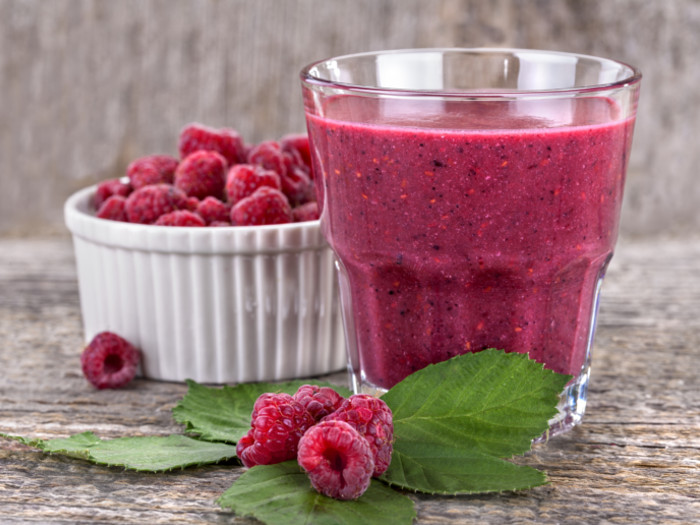Drinking raspberry juice is a tart and delicious way to increase your nutrient intake and enjoy a number of health benefits.
What is Raspberry Juice?
Raspberry juice is the juice that is made by blending or pressing fresh raspberries, which are scientifically known as Rubus strigosus. Due to the incredibly tart nature of this juice, it is often blended with ice and other sweeteners to make it more palatable. However, it is also possible to crush raspberries and then slowly press the concentrated juice through multiple layers of cheesecloth.
This juice is celebrated for its refreshing flavor and uplifting taste, making it an ideal summer drink, but it is also very high in certain nutrients that can boost overall health.

Raspberry juice is a fiber source. Photo Credit: Shutterstock
Serving Size : Nutrient Value Water [g] 41.15 Energy 221 Energy [kJ] 924 Protein [g] 3.04 Total lipid (fat) [g] 1.34 Ash [g] 1.29 Carbohydrate, by difference [g] 53.19 Fiber, total dietary [g] 1.1 Sugars, total including NLEA [g] 38.21 Sucrose [g] 1.03 Glucose (dextrose) [g] 17.1 Fructose [g] 20.09 Starch [g] 0.32 Calcium, Ca [mg] 97 Iron, Fe [mg] 1.16 Magnesium, Mg [mg] 112 Phosphorus, P [mg] 100 Potassium, K [mg] 1178 Sodium, Na [mg] 10 Zinc, Zn [mg] 1.29 Copper, Cu [mg] 0.14 Manganese, Mn [mg] 4.67 Vitamin C, total ascorbic acid [mg] 38.1 Thiamin [mg] 0.25 Riboflavin [mg] 0.34 Niacin [mg] 3.89 Pantothenic acid [mg] 2.7 Vitamin B-6 [mg] 0.25 Folate, total [µg] 9 Folate, food [µg] 9 Vitamin E (alpha-tocopherol) [mg] 0.06 Fatty acids, total saturated [g] 0.06 4:0 [g] 0.01 8:0 [g] 0 10:0 [g] 0 12:0 [g] 0.01 14:0 [g] 0 15:0 [g] 0 16:0 [g] 0.02 17:0 [g] 0 18:0 [g] 0.01 Fatty acids, total monounsaturated [g] 0.03 16:1 [g] 0 16:1 c [g] 0 18:1 [g] 0.03 18:1 c [g] 0.03 20:1 [g] 0 Fatty acids, total polyunsaturated [g] 0.01 18:2 [g] 0.01 18:2 n-6 c,c [g] 0.01 18:3 [g] 0 18:3 n-3 c,c,c (ALA) [g] 0 Sources include : USDA [1]
Nutrition Facts
Nutritionally speaking, raspberry juice possesses almost all of the same nutrients as raspberries, particularly if the berries are blended, rather than pressed. Raspberry juice typically contains high levels of vitamin C and dietary fiber, as well as smaller amounts of iron, magnesium, omega-3 fatty acids, potassium, and vitamin B6. One cup of raspberry juice, unsweetened, contains approximately 100 calories.
Benefits of Raspberry Fruit Juice
The most notable benefits of raspberry fruit juice are its ability to improve heart health, boost weight loss efforts, and increase blood circulation, among others.
Cancer
Berries are rich in various bioactive constituents such as tannins, stilbenes, flavonoids, and more. A 2016 study observed the anticancer effects of these compounds on colon cancer, suggesting that the overall composition of berries, such as raspberry, could prove helpful against this cancer. This is further supported by another study in the Journal of Carcinogenesis which concludes that phytochemicals from raspberries could inhibit stages of colon cancer. [2]
A 2019 research published in the Oxidative Medicine and Cellular Longevity journal also studied the antioxidant and anti-inflammatory properties of this fruit, concluding that it could provide protection against the damage caused by UVB rays, which could lead to skin cancer. It was also found to have cytotoxic effects. [4] [5]
Heart Health
There is a good amount of anthocyanins found in this tangy juice, which are known to protect against heart disease by improving the integrity and strength of the arteries and blood vessels. [6]
Immune System
With great levels of vitamin C, this juice can help boost the immune system and defend against any number of infections or potential pathogens. This is in addition to the antioxidants, which reduce the strain on the immune system by lowering chronic inflammation. [7]
Circulation
The potassium in raspberries helps to lower blood pressure, and other active ingredients work as blood-thinners. When combined, this means better delivery of nutrients and oxygen to the body and reduced hypertension symptoms. [8]
Weight Loss
High in fiber and low in calories, this juice is a nutrient-dense addition to your diet that can help you feel full and prevent overeating and the habit of snacking. [9]
Allergies
The effect that this juice can have on the immune system means a more controlled release of cytokines and other inflammatory molecules and fewer unnecessary symptoms. [10]
Digestion
When these berries are blended, they retain all of their dietary fiber, which can improve peristaltic motion and boost digestive health. [11]
Side Effects
The only side effects from drinking this juice arise if a person is allergic to raspberries, or if the fruit hasn’t been properly washed, increasing the risk of bacteria or other unwanted chemicals on the fruit. Excessive consumption can also cause stomach upset and diarrhea, so always consume this beverage in moderation.
